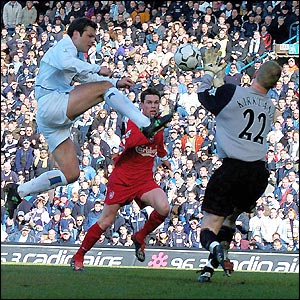Latinos in Soccer
Differences between Soccer and Baseball in the USA
Differences between Soccer and Baseball in the USA
To better understand why soccer struggles in the USA even with all of its Latino backing, one must understand why it is different from baseball (not in terms of the game itself). This page will very briefly describe the differences between them, as it is very complicated.
Soccer
Soccer, first off, is a sport that is coming into the United States , and not leaving it. First off, unlike baseball soccer did not originate in the United States . Its real origins are actually unknown, but there are many possible predecessors to the game. One can say that soccer was officially born as a true sport in 1863 when The Football Association of England branched off from an association that combined rugby and soccer. Soccer has evolved over many years, and has been spread all throughout the world ( 24 ). There is no more widely played sport in the world
Baseball
Baseball is the “American Pastime”. It is of American origin and has spread through many countries in the world, not as much as soccer though. Its origins are better known than soccer. There are books depicting the game as far back as 1744. ( 25 ). More con baseball can be found in the links to the left.
Why are they different?
The games are different in many ways. The largest, which will be the main focus of this section, involves how they games are being globalized—ie. How they are being spread throughout the world.
Soccer is basically all around the world. Even countries with little soccer tradition have been accepting it quite well, with the exception of the United States . There are a couple of good examples of this:
• Venezuela : traditionally this Venezuelan country has been associated with baseball. Yet, in the more recent years it has become more and more soccer friendly. Teams such as Deportivo Tachira and Union Atletico Maracaibo have been having some success in competitions with teams from other countries such as in the Libertadores Cup. Deportivo Tachira made it all the way to the quarter-finals of the competition, where it was eliminated by São Paulo FC of Brasil. Venezuelans are becoming proud of not only their local teams, but also of their national team. There is a link to a fan page of supporters of Deportivo Tachira present in this website.
• India : A country whose traditional sport has been cricket—a piece of British colonization which has never left the culture. Yet, India , without practically any soccer tradition almost beat a traditional powerhouse, France, in the soccer competition in the 1948 Summer Olympics. India has a true soccer league (NFL—National Football League). It has many Brasilian and other foreign players ( 25 ). It has accepted soccer with no problem ( 17 ).
• Australia : A country who, like India , has left over British colonial influence. To this day rugby is considered to be the Australian sport of choice. Yet soccer has made its way into Australia . Australia has a true soccer association: The Australian Soccer Association and a true league: the Hyundai A-League. Nowadays, soccer is a very common sport in Australia . Australia has one of the toughest paths to go to the World Cup—they must win the Oceania Football Conference World Cup Eliminatory Round and then play the last place qualified team of the CONMEBOL ( S. America 's league) to go to the World Cup. And, even with all that, Australia has gone a couple of times to the World Cup and has done fairly well. This country has even produced some of the best soccer players in the world, most recently: Mark Viduka.
If these countries, with cultures so different from many of the major soccer nations, accepted soccer, then why do we have trouble accepting it? It is because soccer seems to try to enter and change American culture, whereas baseball is an “ambassador of American culture”—it takes American culture to other countries. Soccer in the US is seen as something foreign, sort of like some European fashion. It is so foreign that some people even say that you should not like it; that it is anti-American to like the sport. USA Today 's Tom Weir said, “that hating soccer is more American than apple pie, driving a pickup, or spending Saturday afternoons channel surfing with the remote control”. Another famous journalist, Allen Barra of the Wall Street Journal says, “Yes, OK, soccer is the most ‘popular' game in the world. And rice is the most ‘popular' food in the world. So what? Maybe other countries can't afford football, basketball, and baseball leagues: maybe if they could afford these sports, they'd enjoy them even more” ( 17 ). There is one major flaw with this though. If soccer is such a poor sport in terms of cost, then why is the MLS not making a profit, but losing $15million a year? ( 18 )
Another thing that makes it hard to accept is that it is mostly a sport for Latinos and middle/upper class white families. “Half of the nation's soccer participants come from households earning over $50,000”. Barra argues that Americans play soccer only because it has a “European label” and thus it is fashionable to play soccer ( 18 ).
Baseball on the other hand is a true, transgenerational tradition that gets passed down from father to son to grandson in this country. As Foer says, “that's one reason why the game gets so much nostalgia-drenched celebration in Kevin Costner movies and Sephen Jay Gould books”. Unlike other American sports or soccer, baseball really is not trying to expand throughout the world—specifically in countries where it isn't really all that popular. The world doesn't really care for the game. And it appears that the US is not caring about it anymore. As discussed in the section on baseball, many foreign Latino players are entering the league and becoming its greatest stars—White American players are losing ground. ( 17 )
Baseball's popularity is decreasing while soccer's is increasing. According to Foer, “the number of teens playing baseball fell 47 percent between 1987 and 2000. During that same period, youth soccer grew exponentially. By 2002, 1.3 million more kids played soccer than Little League”. Not only that, baseball has not really tried to enter non-Caribbean Latino markets, whereas soccer has treed and succeeded. Even Nielson ratings for baseball keep going down—“a World Series can no longer draw the same number of viewers as an inconsequential Monday night game in the NFL” ( 17 ).
Foer argues that this “fear” of soccer is a reflection of the American fear that globalization will cause a cultural split ( 17 ). Yet, a cultural split already happened as the last election showed: blue and red states—this country now is split between “liberals” and “conservatives”. Foer argues that these red state people are the ones who resist soccer the most, as it represents European values such as “an aggressive secularism, a more relaxed set of cultural mores a more relaxed set of cultural mores that tolerates gays and pot smoking” and by accepting soccer, one would be accepting such “negative” values ( 17 ). Soccer, unlike baseball, is a “culprit” in the cultural war in this country. Thus, this country can stick to baseball (traditional values) or accept soccer (and “become part of the world”). In this country “soccer is problematic” whereas baseball isn't in any other country.



